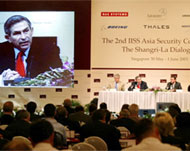US reassures Seoul on troop re-shuffle
US Deputy Defence Secretary, Paul Wolfowitz, arrived in the South Korean capital Seoul on Sunday for talks aimed at reassuring the country’s leaders that planned changes in Washington’s regional military plans will not diminish their 50-year-old alliance.
 |
|
Wolfowitz believes that Pyongyang |
The changes to American troop deployments will make South Korea less vulnerable to North Korean threats, insisted Wolfowitz.
He was speaking at Camp Greaves, South Korea’s most
forward US army base. South Korea hosts about 47,000 US soldiers under a mutual defence pact.
Wolfowitz, who carries a reputation for being a hawk in the US administration, insisted no decisions had been made on troop realignment in Asia as part of a restructuring of US troops worldwide.
He is the most senior Pentagon official to visit East Asia since the Bush administration took office two years ago.
“We are determined to enhance the quality of our alliance with the Republic of Korea and, in doing so, to strengthen deterrence on the Korean peninsula and stability in north east Asia,” said Wolfowitz on Saturday in Singapore.
But well-informed experts in Seoul told Reuters that South Koreans were on edge and uncertain how to deal with Wolfowitz, angry that proposals about redeployments had been reported in the media before being disclosed to them.
“Life and death”
One expert was quoted as saying that South Korea viewed a possible re-shuffle of US forces as a life and death issue.
The Los Angeles Times reported last week that Washington was considering moving most of the 20,000 US Marines out of Okinawa, Japan to new bases in Australia and increasing the presence of troops in Singapore and Malaysia.
It also reported that Washington was seeking to locate Navy ships in Vietnamese waters and ground troops in the Philippines.
Wolfowitz was quoted as saying in the report that the considerations were not being discussed at any serious level.
But he added that he could not rule out that “at some 8th level of the bureaucracy somebody is entertaining the idea of moving our Marines from Okinawa to Australia.”
South Korean fears
Seoul says its units in the demilitarised military zone with North Korea are poorly equipped. If US troops withdrew from that line, it would have to spend millions of dollars to compensate for lost firepower.
Seoul’s concern is aggravated by the continuing crisis caused by North Korea’s plans to forge ahead with its nuclear programme and regular skirmishes between the two arch-rivals.
Hours before the Pentagon’s number two official arrived, South Korea’s Navy fired warning shots at eight North Korean fishing boats. Seoul claimed they had illegally crossed into southern territorial waters.
The boats turned back soon after the confrontation. There were no immediate reports of injuries or damage in the incident off Yongpyong Island, west of the peninsula.
It was the sixth day of confrontations between north and south Korean boats along the disputed western sea border in a week.